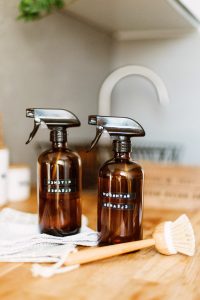
Hydrogen peroxide, as you may remember from school, is just water with an extra oxygen atom. It is commonly used as a first aid solution for its potent antiviral, antibacterial and antifungal properties. However, something you probably did not know is that a 3% hydrogen peroxide solution is great for cutting through organic stains and rust. It is a great choice for cleaning since it is inexpensive, safe, and harmless. It is perfect for you, especially if you recently turned to green cleaning or prefer to steer clear of harmful commercial cleaning products. Keep reading to discover the many uses of hydrogen peroxide around the house.
1. De–gunk tile and grout
Hydrogen peroxide mixed with sodium carbonate is what makes oxy bleach. When water is added, the solution releases an oxygen molecule to help lift mould and stains from any natural surface. For a potent homemade tile and grout cleaner, mix ½ cup of baking soda with ¼ cup of hydrogen peroxide in a sealable container. Add 1 teaspoon of liquid dish soap, close the container and shake well until the solution is mixed. Apply this mixture to tile and grout that are stained, let it sit for 5 minutes, then rinse well with clean water.
2. Brighten up the bathtub
Mould and grime are not uncommon in bathrooms. Because of the high levels of moisture and humidity, you may experience those on your walls, ceiling, and bathtub. The problem with commercial bathtub cleaners is that they often contain bleach or ammonia, which are toxic and harmful to human health. For a safe homemade cleaner, mix 2 parts baking soda and 1 part hydrogen peroxide into a paste. Apply to the bathtub, let it sit for 30 minutes, then rinse away. Follow with a spritz of a 1:1 solution of vinegar and water to eliminate any soap scum or residue.
3. Get rid of rust
In fact, hydrogen peroxide can be used to speed up the rusting process (you can use it to instantly get an antique-looking metal item). However, it is also able to remove rust. In a bowl, mix equal parts of cream of tartar and baking soda. Add a few drops of hydrogen peroxide, enough to form a paste. Apply the paste onto the rusty object, let it sit for an hour, then wash them with water. This method is great for moderately rusted items like tools or toys, but you can also use it for orange stains left on your sink, for example.
4. Disinfect your wooden cutting boards
Wooden cutting boards are pretty porous and can sustain cuts and cracks that will trap unhealthy bacteria. To safely disinfect a cutting board made of wood, spray it with white vinegar, wait 5 minutes, then wipe it down. Then pour 3% hydrogen peroxide solution all over the board and rub it in with a sponge. Let it sit for another 5-10 minutes, then sprinkle salt all over it and rub it in with half a lemon. That will remove any remaining odours.
5. Treat your plants
A spray of hydrogen peroxide on your plants can improve the growth process and also treat fungus, pests,m and root rot. However, you should be careful not to use too much hydrogen peroxide since you may damage plants and beneficial organisms. Mix 1 tablespoon of hydrogen peroxide and 1 cup of water and soak the soil of the plant with this solution once or twice a week.
6. Erase stains from marble and granite
Natural stone countertops can get stained, especially when in the kitchen. For hard water stains on granite surfaces, mix ½ cup of baking soda and add a few drops of hydrogen peroxide. Spread the paste on the stained area, let it sit for 5-10 minutes, then wipe away with a clean cloth. For natural stains on marble surfaces, mix 1 cup of 12% hydrogen peroxide solution and a few drops of household ammonia in a spray bottle. Use this method in a well-ventilated area only. Spray the mixture on the stained area, let it sit for 1-2 minutes, then wipe away. Repeat until the stain is completely gone.
7. Brighten your whites
Hydrogen peroxide comes in handy when washing white clothes. To brighten up whites that have become dull or greyish, add 1 cup of hydrogen peroxide directly to your washing machine, as you would use bleach. Hydrogen peroxide has the same properties but is eco-friendly and safe. You can also use it as a stain remover for natural stains. Simply add some hydrogen peroxide to the stained area, let it sit for 10 minutes and wash the garment as you usually would.
8. Disinfect your stinky sponges
With time, sponges that you use for cleaning around the house may become dirty and develop a bad odour. What is more, when not cleaned regularly, they can trap germs and bacteria. Cleaning your sponges with hydrogen peroxide is easy – simply soak them in a solution of equal parts 3% hydrogen peroxide and water, let them sit for about 10 minutes, then rinse them with clean water.
